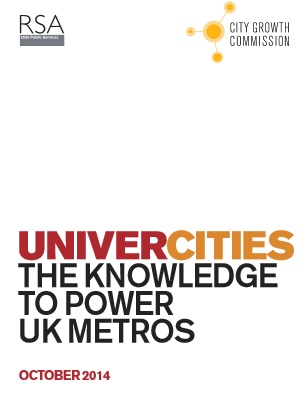Cities call for HE investment powers
Groups of local authorities and universities should be allowed to use public money to create Metro Investment Funds for Higher Education focused on major urban areas, according to the latest report from the City Growth Commission.
UniverCities makes recommendations for universities to enhance their economic impact on the largest UK cities and their surrounding areas.
More than half of the UK's 123 universities – 72 – are in the 15 largest city regions. The commission, in which Manchester has been a driving force, says the government invests £7bn a year in higher education but the "financial and performance incentives which universities respond to are largely agnostic to the location of their impact."
The commission, which published the report today, said in a statement accompanying the publication: "Competing in the global economy, universities will serve as increasingly important anchor institutions in UK cities. They are already playing a key role, driving forward innovation in the knowledge economy and contributing to a skilled workforce by attracting the best global talent."
The main cities studied to gather research for the report were Newcastle, Bristol and Cardiff.
The commission continued: "Given the importance of tertiary education and the global standing of our leading universities, mainstream funding for HEIs should continue to be based on standards of excellence for research and teaching. However, to respond to growth opportunities related to workforce skills and industrial innovation within the local metro area, the Commission suggests a range of measures to maximise the local and regional economic growth benefits from university activities."
The Metro Investment Funds for Higher Education would align the content of teaching and research to the demands of the metro economies in which they are located. City regions should get new freedoms and flexibilities to establish the special investment funds. These could be coordinated by combined authorities or through collaboration between local authorities and local enterprise partnerships.
A large part of the report deals with graduation retention and makes several recommendations including ReFreshers weeks with universities campaigning for graduates to stay in the local area by offering advice, matching them to employment and volunteering opportunities, and helping them find housing.
The authors say there should be a centralised 'graduate clearing' system which pools rejected graduate recruitment applications and recycles them to local firms with vacancies. Similar to the UCAS clearing scheme, graduates who have not found a place in corporate schemes being connected to other firms, including SMEs, looking to recruit. Golden 'handcuffs' could reward commitments from graduates to work locally. Industry associations, start-up incubators, or university careers services could attract subscriptions from firms to support a student loan repayment bonus, made after a loyalty period ends.
Also, greater enterprise among students, graduates and academics should be encouraged. Higher education institutions should co-invest with business improvement districts, which charge businesses a rates levy to invest in their area, and industry partners to support start-up incubation and acceleration space located in innovative urban districts. Core cities could pilot a more flexible graduate entrepreneur visa which would encourage more international students to start a business in the UK after graduation.
University courses should, by default, allow sandwich years for employment and enterprise. Students should have access to an enterprise module.
The City Growth Commission was established in October 2013 to run for a year to investigate how cities other than London can help boost the national economy. The commission is chaired by economist Jim O'Neill, who advises Greater Manchester Combined Authority. The final report of the commission is due out next week.




